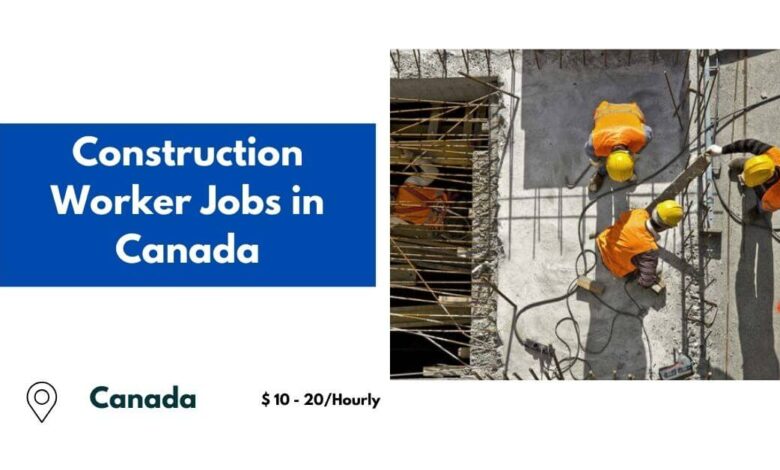Construction Worker Jobs in Canada 2025 – Visa Sponsorship

Canada’s construction industry is experiencing a high demand for workers, especially as the country’s urban centers grow and infrastructure projects expand. Whether you’re an experienced construction professional or someone looking to start a new career, Canada offers a variety of visa sponsorship options for foreign nationals to work in the construction sector. Here’s everything you need to know about visa options, job requirements, and how to apply for construction jobs in Canada.
Check Also: Visa Sponsorship Recruitment Agencies Jobs in Canada
Visa Sponsorship Overview: A Path to Legal Employment in Canada:
Visa sponsorship enables foreign workers to obtain a work permit and legally enter Canada to work. Foreign workers in the construction industry can apply for a variety of work permits under programs like the Temporary Foreign Worker Program (TFWP), Express Entry, and other specialized immigration pathways. Each of these programs has specific eligibility criteria, and understanding which one suits your profile is key to successfully obtaining a work permit.
Eligibility for Visa Sponsorship:
To qualify for a Canadian work visa as a construction worker, you must meet certain criteria. These include:
- Valid Job Offer: You must have a job offer from a Canadian employer in the construction industry. The employer must demonstrate a need for foreign workers, especially if they cannot find Canadian workers to fill the positions.
- Work Experience: Depending on the job role, relevant experience in the construction field may be required. While many positions are open to workers with minimal experience, certain specialized roles might require several years of prior experience.
- Language Proficiency: Most Canadian employers prefer workers with proficiency in either English or French. Candidates may need to take a language test such as IELTS (International English Language Testing System) or CELPIP (Canadian English Language Proficiency Index Program). The language requirements can vary by job and region, so it’s important to verify the requirements before applying.
Types of Work Permits:
There are two main types of work permits you can apply for under Canada’s visa sponsorship system:
- Employer-Specific Work Permit: This allows you to work for a specific employer in a specific location. Employers must typically apply for a Labour Market Impact Assessment (LMIA) before hiring foreign workers, except in certain cases where LMIA exemptions apply (e.g., under international trade agreements).
- Open Work Permit: Unlike employer-specific permits, an open work permit allows you to work for any employer in Canada, though it may not apply to construction workers unless under specific immigration programs like the International Mobility Program (IMP) or post-graduation work permits.
How to Apply for a Visa Sponsorship?
- Secure a Job Offer: Start by finding an employer in Canada willing to sponsor your visa. You can search job boards such as Job Bank Canada, Indeed, and LinkedIn for positions in construction.
- Employer Submits LMIA Application: If you receive a job offer, your employer will apply for an LMIA, a process that evaluates the impact of hiring foreign workers on the Canadian job market. Once an LMIA is approved, the employer can issue a job offer letter.
- Apply for Work Permit: After the LMIA is approved, you can apply for a work permit via the Immigration, Refugees and Citizenship Canada (IRCC) website. The application may take several weeks or months depending on your nationality and the type of visa you are applying for. Ensure that all documents, such as your job offer letter, LMIA, and language test results, are included in your application.
Construction Worker Job Requirements in Canada:
The construction sector in Canada offers a wide range of opportunities, from entry-level labor positions to specialized skilled trades. Below are the qualifications that are typically required for construction workers in Canada.
Essential Qualifications:
- Experience: Many construction jobs prefer candidates with one to two years of experience in a related field. However, employers often offer on-the-job training for entry-level workers, so you don’t necessarily need years of experience to get started in construction.
- Physical Fitness: Construction work is physically demanding. Workers should be able to lift heavy objects, work in various weather conditions, and be on their feet for long periods. Physical fitness is crucial for safety and effectiveness on the job site.
- Safety Training: Construction sites in Canada are highly regulated for safety. Completing safety training courses such as WHMIS (Workplace Hazardous Materials Information System), First Aid, and construction site safety courses can greatly enhance your employability.
- Driver’s License: While not always required, some positions may require a valid driver’s license and a clean driving record, particularly for roles involving the transportation of materials or equipment.
- Language Skills: Proficiency in either English or French is often required to ensure effective communication and adherence to safety protocols on the job site.
Additional Preferred Qualifications:
- Trade Certifications: Although not all construction roles require trade certifications, having one in a specialized field (e.g., carpentry, plumbing, electrical work) can significantly improve your job prospects.
- Apprenticeship Training: Some construction jobs may prefer workers who have completed apprenticeship programs in their trade. These programs combine classroom education with hands-on, on-the-job experience.
Construction Worker Responsibilities:
The tasks you may be assigned as a construction worker in Canada will vary depending on the job and type of project. Below are some common responsibilities:
- Preparing Construction Sites: This includes setting up scaffolding, marking boundaries, and ensuring the site is cleared of debris.
- Material Handling: You may be asked to unload and organize materials such as cement, bricks, and steel.
- Equipment Assistance: Operating or assisting with machinery, including cranes, backhoes, and bulldozers, under supervision.
- Health & Safety Compliance: Following strict safety protocols, including wearing personal protective equipment (PPE) and reporting unsafe conditions.
- Structural Tasks: This includes tasks such as pouring concrete, laying bricks, or installing scaffolding.
- Collaboration with Other Workers: Construction workers often work alongside other tradespeople such as electricians, painters, and plumbers to ensure the project progresses smoothly.
Benefits of Working as a Construction Worker in Canada:
The construction industry in Canada offers various benefits to workers, making it a desirable career choice for foreign nationals:
- Job Security: Construction is a growing industry in Canada. With the demand for infrastructure development and urban expansion, there will always be a need for skilled labor.
- Competitive Pay: Construction workers in Canada can earn between $15 and $30 per hour, depending on their role and experience. Skilled positions, such as crane operators and electricians, can command higher salaries, often exceeding $70,000 annually.
- Skill Development: There are ample opportunities to learn new skills and advance in your career through on-the-job training, formal certifications, and apprenticeship programs.
- Career Advancement: Experienced workers can move into supervisory or managerial roles. For example, you could become a foreman, project manager, or even a construction engineer with further training.
- Health & Benefits: Many Canadian employers offer benefits packages that include healthcare, dental, and vision coverage. Some also offer retirement plans or union benefits, providing added job security.
How to Apply for Construction Jobs in Canada?
To apply for construction jobs in Canada, follow these steps:
- Research Available Jobs: Start by browsing job listings on platforms like Job Bank Canada, Indeed, and LinkedIn. You can also find recruitment agencies specializing in foreign worker placements.
- Prepare Your Resume: Tailor your resume to highlight your relevant skills, experience, and certifications. Make sure to include any safety certifications or trade licenses you have acquired.
- Submit Your Application: Follow the employer’s application instructions. Some employers may require you to apply directly on their websites, while others may accept applications through job portals.
- Prepare for Interviews: Be ready to discuss your experience, ability to work in physically demanding environments, and knowledge of safety protocols.
Conclusion:
Canada’s construction industry offers robust opportunities for foreign workers looking to build a career in a growing and dynamic field. With strong demand for labor, competitive wages, and ample room for growth, the construction sector is an attractive option for those willing to put in the effort. By understanding the visa sponsorship process, meeting job qualifications, and using the right resources to find employment, foreign workers can successfully navigate the Canadian job market and build a rewarding career in construction.
Frequently Asked Questions:
-
Are construction workers in demand in Canada?
According to BuildForce Canada, a national organization dedicated to the development of a highly skilled construction workforce, the industry is expected to need more than 309,000 new workers by 2030 to replace retirees and keep pace with demand.
-
Can I move to Canada as a construction worker?
Those in the construction industry qualify to work in Canada under an in-demand occupation in the immigration category. With the relevant skills and experience, there’s a huge opportunity to work as a construction worker in Canada for foreign national workers.
-
How do I become a construction worker in Canada?
An apprenticeship training program consists of on-the-job and in-school training. Generally, the timeframe to become competent in the trade of construction craft worker is 2,880 hours (approximately one and a half years), consisting of 2,400 hours of on-the-job work experience and 480 hours of in-school training.



